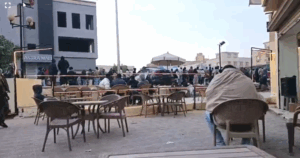Staple food prices continue to increase in Sudan
Because of the continuing economic crisis in Sudan and Covid-19 containment measures, staple food prices continued to increase more rapidly than normal last month, the UN Office for the Coordination of Humanitarian Affairs stated in its latest Situation Report.
 A man starts the engine of his automatic sorghum and millet mill in the El Mawashi market in El Fasher, North Darfur (Albert González Farran / Unamid)
A man starts the engine of his automatic sorghum and millet mill in the El Mawashi market in El Fasher, North Darfur (Albert González Farran / Unamid)
Because of the continuing economic crisis in Sudan and Covid-19 containment measures, staple food prices continued to increase more rapidly than normal last month, the UN Office for the Coordination of Humanitarian Affairs stated in its latest Situation Report.
Prices for sorghum, millet, and wheat have increased by 20 to 50 per cent between April and May, the Famine Early Warning Systems Network (FEWS NET) reported in their latest Key Message Update.
At these levels, prices remain more than double compared to last year and more than four times higher than the recent five-year average. These price increases are being driven by a combination of the continued macro-economic crisis as well as coronavirus control measures that are limiting market supply.
High prices, in combination with significant reductions in labour income –due to lockdowns– are likely to result in increasing humanitarian assistance needs through at least September.
According to FEWS NET, more people, including displaced people in Darfur and South Kordofan, and poor households in urban and rural areas most affected by Covid-19 control measures, are expected to face crisis levels of food security –when there is a critical lack of access to food, as well as high malnutrition and a depletion of livelihood assets that, if continued, will slide the people into worse food insecurity or chronic poverty– or worse through September.
Emergency levels of food security –when there is a severe lack of access to food, as well as very high malnutrition and mortality rates, and irreversible livelihood asset stripping– outcomes are expected among displaced people in conflict-affected areas in Jebel Marra in Darfur, in areas controlled by the Sudan People’s Liberation Movement-North in South Kordofan, as well as in parts of Red Sea and Kassala states during the peak of the lean season from June to September.
In April, Sudan’s annual inflation rate reached 98.81 per cent, compared to 81.64 per cent in March. Rural areas were the hardest hit.
The increase was attributed to rise of the prices of all components of “the food and beverage group”, the most important of which are oils, fats, bread, grains, meat, vegetables, milk, cheese, and sugar, in addition to the rise in “the housing group” due to the high prices of cooking gas, charcoal, firewood, and in “the transportation group” because of the high fuel prices.

Export halted
Radio Dabanga reported two months ago that the Ministry of Industry and Trade stopped the export of sorghum, because of the poor yields during the former agricultural season, and the need to build stocks and reserves of the important staple food.
In early March, the national total production of sorghum and millet in 2019/20 was estimated at 5.1 million tonnes, which is 36 per cent below the previous year’s record output. Between February and March, the prices of sorghum and millet increased atypically by 10 to 20 per cent in most Sudanese markets, reaching levels of 250-350 per cent above the five-year average.
Sorghum, millet, and wheat are the most important food commodities in Sudan. Sorghum is the staple food for the majority of households in central and eastern Sudan, sorghum and millet in Darfur and parts of Kordofan. Wheat is the main staple food in the northern states.
Radio Dabanga’s editorial independence means that we can continue to provide factual updates about political developments to Sudanese and international actors, educate people about how to avoid outbreaks of infectious diseases, and provide a window to the world for those in all corners of Sudan. Support Radio Dabanga for as little as €2.50, the equivalent of a cup of coffee.












 and then
and then